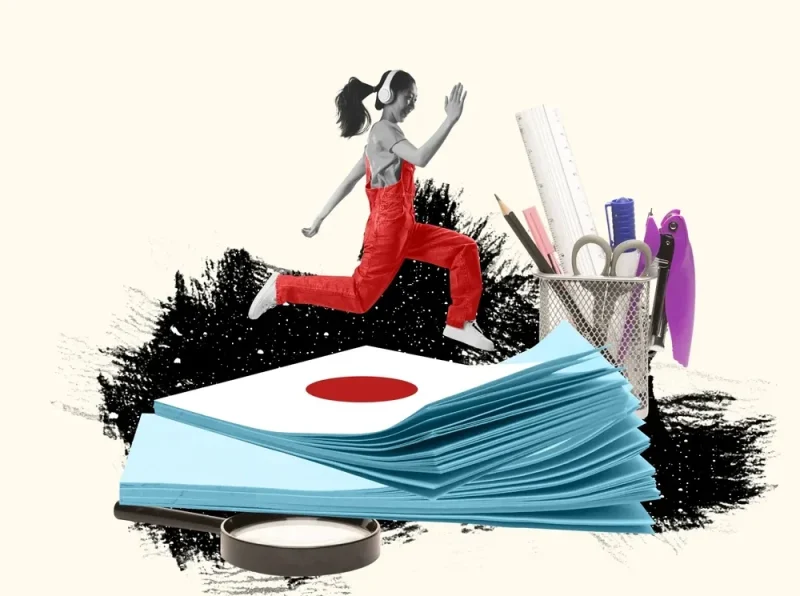What does "ざっくり (zakkuri)" mean and how to use it? Polite Business Paraphrases

Have you ever heard the term "ざっくり (zakkuri)"? You may have had trouble understanding its meaning in Japanese conversation. Although this term is often used in Japanese business situations, it is important to know the exact meaning, background, and proper usage.
This article is an easy-to-understand explanation of the meaning, usage, and examples of "ざっくり" used in business situations. Read this article to learn the meaning of "ざっくり" well!
▼Goandup Picks Click here for recommended articles!
- Required before studying abroad! Goandup Nihongo+, an online Japanese language learning service
- This page introduces services for foreigners who wish to study in Japan or improve their Japanese language skills to learn Japanese online.
- Goandup Salon" community for foreigners living in Japan
- We introduce an online community where foreigners living in Japan can exchange information and interact with each other to support their life in Japan.
- Goandup Study" supports foreigners who want to study in Japan.
- This section introduces study abroad support services that provide comprehensive support to foreigners who wish to study in Japan, from preparation for study abroad to living in Japan.
- Where can I buy a prepaid SIM in Japan? Recommended SIM cards for foreigners are also introduced.
- How to purchase a prepaid SIM and suitable SIM cards for foreigners.
- The Complete Guide to Pocket Wi-Fi in Japan for Foreigners!
- We introduce how to select and recommend pocket Wi-Fi products that can be used conveniently in Japan.
- The Complete Guide to Finding a Job in Japan! Finding a job, changing jobs, and part-time work for foreigners
- This site provides foreigners who want to work in Japan with comprehensive information on how to find a job, recommended job sites, and other information necessary to find a job.
The correct meaning of "ざっくり (zakkuri)" is explained in simple terms.

The primary meaning of "ざっくり" is "broadly" or "without detail." This is often used in situations where one wants to avoid fine details and emphasize the main points or broad outlines. However, another meaning is "to cut at once" or "to break at once".
In business settings, it is used primarily in the sense of "roughly," meaning a brief explanation or general outline of the situation.
How to Pronounce "ざっくり (zakkuri)" Correctly
The pronunciation of "ざっくり" has the accent on the "za" in the first syllable, with a slight emphasis on the "kuri" part in particular.
Related Words and Synonyms with Similar Meanings to "ざっくり (zakkuri)"
Words with the same nuance as "ざっくり" include "大体 (roughly)" and "おおよそ (approximately)". These words are also often used to convey overall meaning or a general outline.
Synonyms and synonyms for "ざっくり (zakkuri)
Antonyms of "ざっくり" include "詳しく (in detail)" and "具体的に (specifically)", while a synonym would be "大まかに (roughly)".
- antonym:"詳しく (in detail)", "具体的に (specifically)"
- synonym:"大まかに (roughly)"
Usage of "ざっくり (zakkuri)" with example sentences

Let's take a closer look at how the expression "ざっくり" is used, with examples of actual business situations. Through these examples, you will understand the specific usage of the phrase "ざっくり" and its effective use in your business communication.
Rules for using "ざっくり (zakkuri)"
The word "ざっくり" is mainly used as an adverb in sentences, combined with verbs, adjectives, or nouns. For example, it can be used in phrases like "ざっくり計画する (plan roughly)" or "ざっくりとした見積もり (rough estimate)", where "ざっくり" is combined with the verb "計画する (to plan)" or the noun "見積もり (estimate)". There is also the adjectival use "ざっくりした", which is used to indicate general characteristics or outlines.
Example sentences using "ざっくり (zakkuri)" in business situations
"ざっくりと説明します"
This expression is used to omit detailed figures and data and convey only the big picture or main points of a project.
"ここまでざっくりやっておいてください"
This statement implies an instruction to prepare only the general framework and to work on the details later. It is used to request that the work be completed in broad strokes, focusing only on the essentials.
Thus, when the term "ざっくり" is used, it is often used to imply that the focus is on the major points or main points and not on the details.
Examples of usage & paraphrasing in business situations

The term "ざっくり" has a casual feel to it and should be avoided in business situations, depending on the person or situation. It is recommended that more formal wording be chosen, especially in formal documents and presentations.
For example, the expression "ざっくり" can be rephrased into the following more formal wording when used in business situations.
- 大まかに (broadly): This gives a slightly more formal impression than "ざっくり", and is used to refer to main points or general frameworks.
- 概略的に (in outline): This expression is used when referring to the general framework or main points of events or content.
- 概要を述べる (to summarize): This is used when briefly explaining the main points or important parts of the whole.
- 一般的に (generally): This is suitable when explaining something without referring to specific details.
These more formal expressions must be chosen appropriately for the particular context and situation. It is very important in business communication to recognize when casual language is acceptable and when more formal language is required.
If you want to know more about ◆Business Japanese, check out the following articles!
- What does [understand well] 「逆に」 mean? Thesaurus and example sentences.
- Explains the meaning of the business term "draft". Is it different from draft beer?
- What is the meaning and usage of the word "drop"? And example sentences in business situations.
- Business x Japanese - What does "展開する" mean? Explanation + Example sentences
- What does "ass" mean as used in business conversation?
- What does "Tatakidate" mean in Business x Japanese? Explanation + Example Sentences
How do you say "ざっくり (zakkuri)" in English?
The Japanese nuance of "ざっくり" is mainly expressed in English by using words such as "broadly" and "roughly".
"Broadly" carries the meaning of "widely" or "roughly", and signifies explaining from an overall perspective or in a wide range without going into detailed content. This is a very close word to "ざっくり".
"Roughly" carries the meaning of "approximately" or "more or less", and is often used to indicate approximate numbers or outlines rather than precise accuracy.
These words, like "ざっくり," are useful when you want to convey general information without getting into details, or when you do not have specific numbers or details but want to give general directions.
For those of you who want to further your studies at a Japanese language school

The Japanese language attracts attention from around the world for its rich expressiveness and profound culture. From movies, music, and literature to everyday conversation, learning Japanese is not only a way to acquire a new language, but also a gateway to a deeper cultural understanding and a broader perspective.
For those of you who want to study Japanese more seriously, enter higher education in Japan, or find a job in Japan, taking your Japanese language skills to the next level is the first step in turning your dreams into reality. There are approximately 700 Japanese language schools in Japan with various characteristics, but it is not easy to select the best school for you.
Therefore, we will do our best to help you choose the perfect Japanese language school to realize your goals and dreams! If you have any questions or concerns about Japanese language schools, please feel free to contact us using the inquiry form below.
We will provide you with the best support to meet your Japanese language learning goals. We hope that our support will make your Japanese language study more fulfilling and fruitful.
summary
The phrase "ざっくり" is very useful when you want to get a point across or just understand the big picture. However, in business situations, it is important to communicate clearly so as not to mislead others.
In addition, choosing the appropriate language for the situation allows for more effective communication.






